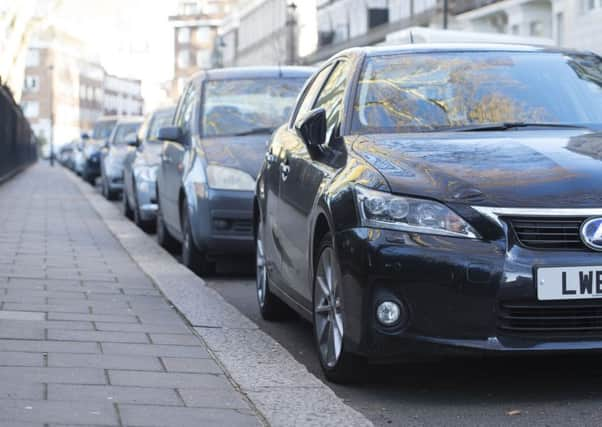Car journeys put off as drivers fear losing their parking spot


A study published today has revealed that almost a fifth of motorists nationally have claimed that they “always worry” about being able to park as they approach their home.
The AA motoring group, which commissioned the research, claimed the problem could be eased if councils review whether all their parking restrictions in residential areas are necessary. But the Local Government Association (LGA) insisted that it is “on the side of motorists”.
Advertisement
Hide AdAdvertisement
Hide AdAA president Edmund King believes rising house prices are making it harder to park as many people are living far away from where they work, meaning they have to own a car to commute. In densely populated areas, many single family houses have been converted into flats, leading to more cars needing to be parked in the same neighbourhood.
Mr King said: “This survey shows that the squeeze on parking is a factor in UK drivers cutting back on car use, a trend that manifests itself in average car mileages falling year on year and UK fuel consumption failing to respond to lower pump prices.
“The list of causes is a long one. Expensive housing has forced people to find homes some distance from where they work and have to drive – a problem exacerbated by both partners needing to work to pay the bills.
“This lack of affordable housing has led to young adults finding jobs but being unable to leave home. They too may need a car to get to work.”
Advertisement
Hide AdAdvertisement
Hide AdThe poll of 24,739 drivers nationally found that 17 per cent of motorists in Yorkshire were concerned over whether they would find a parking space, and nine per cent put off making a journey over fears they could lose their spot. The research revealed that Londoners feel most affected by the issue, with almost a quarter postponing some journeys.
Nationally, 12 per cent of drivers are putting off making a trip to avoid losing their parking space.
The LGA’s transport spokesman Peter Box, who is Wakefield Council’s leader, said the study highlights the difficulties faced by councils in “balancing the requirements of commuters and residents”.
He said: “Councils often introduce restrictions at residents’ request and consult widely on them, but in some places there simply is not enough road space or parking space to accommodate demand.”
Advertisement
Hide AdAdvertisement
Hide AdCoun Box maintained councils are keen to enable people to make journeys without using a car, and called on the Government to fully fund concessionary fares schemes for buses.
The AA published research in October which found that more than one in seven car commuters may be giving their employer an extra hour of unpaid work every day because they arrive early to secure a parking space.
A lack of parking spaces has been a long-running issue. An investigation by The Yorkshire Post in 2008 revealed at least one of the region’s councils was issuing almost a third more permits than there were spaces in some streets – leaving drivers with no guarantee of a space outside their homes.
York Council officers admitted at the time that the number of permits issued often far exceeded available spaces in individual roads. In Millfield Road, the council estimated there were 160 spaces available, but 207 permits – for residents, businesses and guest houses – had been issued.